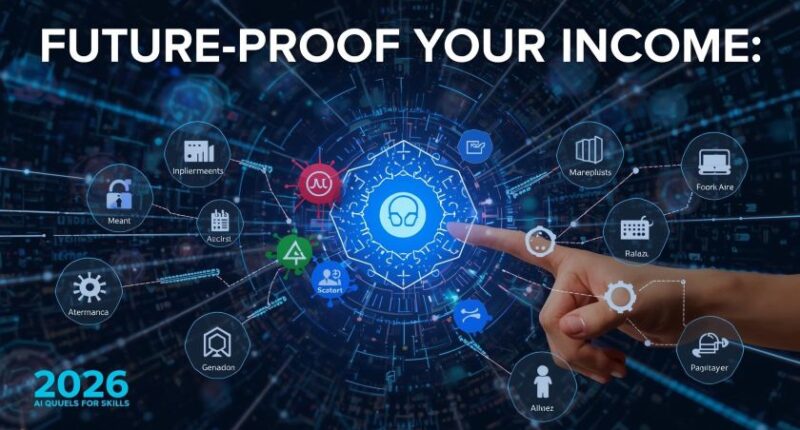The age of Artificial Intelligence is no longer coming — it’s already here. From automation and analytics to content creation and customer service, AI is reshaping how businesses operate and how individuals earn a living. As we approach 2026, the question isn’t whether AI will impact your career — it’s how prepared you are for it.
To stay competitive and future-proof your income, you need to master the right AI skills. In this guide, we’ll explore the top 9 AI skills that will help you thrive in the next digital revolution — whether you’re a freelancer, employee, or entrepreneur.
Why Learning AI Skills Matters in 2026
Artificial Intelligence is set to create millions of new jobs, but it will also automate repetitive ones. According to the World Economic Forum, by 2026, AI will transform over 60% of existing roles, making digital literacy and adaptability more important than ever.
Those who understand how to use AI tools and systems effectively will become indispensable assets to any organization — while those who ignore the trend risk being replaced by automation.
Learning AI skills doesn’t mean you need to become a data scientist. It means learning how to work with AI — to enhance your productivity, creativity, and earning potential.
The 9 Most Valuable AI Skills for 2026
Let’s dive into the essential AI skills that can help you secure your place in the future job market.
1. Prompt Engineering — The Art of Talking to AI
Prompt engineering is one of the most in-demand AI skills today. It involves crafting effective inputs (prompts) for AI models like ChatGPT, Gemini, or Claude to generate accurate and useful outputs.
By mastering prompts, you can make AI write articles, generate code, design marketing campaigns, or even analyze data for you.
What to Learn:
-
How to structure prompts using context and examples
-
Chain-of-thought prompting for complex problem solving
-
Using role-based and goal-oriented instructions
Career Paths:
AI content creator, copywriter, educator, marketing strategist
✅ Pro Tip: The better you can communicate with AI, the more value you can extract from every tool you use.
2. AI Automation and Workflow Integration
The next frontier of AI productivity lies in automation — connecting multiple AI tools to perform tasks automatically.
Platforms like n8n, Zapier, Make (Integromat), and LangChain allow users to integrate AI with business systems (CRM, email, analytics) to run processes 24/7 without human input.
What to Learn:
-
No-code automation with AI APIs
-
Building custom AI workflows
-
Connecting AI with productivity tools (Slack, Google Workspace, Notion)
Career Paths:
Automation specialist, AI operations consultant, productivity engineer
✅ Pro Tip: Automating even one task — like email replies or data entry — can save hours weekly and open the door to freelance or passive income opportunities.
3. Data Literacy and AI Analytics
AI runs on data — and those who can understand, interpret, and visualize data will be in high demand.
You don’t need to be a full-time data scientist; even basic data literacy helps you understand how AI systems make decisions and how to optimize them.
What to Learn:
-
Basics of data cleaning and visualization
-
Using AI tools like Tableau, Power BI, and ChatGPT for data insights
-
Understanding how machine learning models use data
Career Paths:
Business analyst, AI data strategist, performance manager
✅ Pro Tip: Data-driven decisions are the foundation of all AI-driven businesses — learn to turn raw data into strategic action.
4. AI Content Creation and Marketing
By 2026, nearly every piece of online content — from blog posts to videos — will be created or enhanced with AI.
Tools like ChatGPT, Jasper, Copy.ai, Synthesia, and Runway ML allow creators to produce content faster and at lower cost.
What to Learn:
-
Using AI to create long-form articles, ad copy, and video scripts
-
AI video and image generation (Pika Labs, Midjourney, Runway)
-
SEO optimization with AI tools (SurferSEO, NeuronWriter)
Career Paths:
AI content strategist, copywriter, digital marketer, YouTube creator
✅ Pro Tip: Combining creativity with AI tools can make you 10x more productive — and more profitable.
5. AI Coding and Development Skills
Even if you’re not a programmer, understanding how AI code works gives you an edge in every tech-driven industry.
With tools like GitHub Copilot and ChatGPT’s Code Interpreter, anyone can learn to code with AI assistance.
What to Learn:
-
Basics of Python for AI automation
-
Using AI frameworks like TensorFlow and PyTorch
-
Integrating AI APIs into apps and websites
Career Paths:
AI developer, tech entrepreneur, software automation engineer
✅ Pro Tip: AI-assisted coding is now the fastest way to develop apps, bots, or startups — even for non-coders.
6. Machine Learning Fundamentals
If you want to go deeper into AI’s technical side, machine learning (ML) is where the magic happens.
ML involves training algorithms to recognize patterns and make predictions — the core of recommendation systems, fraud detection, and autonomous vehicles.
What to Learn:
-
Types of ML: supervised, unsupervised, and reinforcement learning
-
Data preprocessing and model evaluation
-
Using AutoML platforms (Google Vertex AI, Amazon SageMaker)
Career Paths:
Data scientist, ML engineer, AI researcher
✅ Pro Tip: Even basic ML knowledge makes you more credible in tech and business environments powered by AI.
7. AI Ethics and Responsible Use
As AI becomes more powerful, ethics and transparency are critical. Governments and companies are implementing strict AI regulations, creating a new demand for professionals who understand responsible AI practices.
What to Learn:
-
AI bias and fairness
-
Privacy laws (GDPR, AI Act, data compliance)
-
Ethical frameworks for AI use
Career Paths:
AI policy advisor, compliance manager, tech consultant
✅ Pro Tip: Companies need professionals who can balance innovation with integrity — and this field is growing rapidly.
8. AI Design and User Experience (AI UX)
AI isn’t just about data — it’s also about how people interact with intelligent systems. Designing intuitive, human-centered AI experiences will be crucial by 2026.
What to Learn:
-
Conversational UX for chatbots and AI agents
-
Human-AI collaboration design principles
-
Tools like Figma AI, Uizard, and Adobe Firefly
Career Paths:
UX designer, product manager, AI interface designer
✅ Pro Tip: The future of AI depends on design that feels natural and human — not robotic.
9. AI Entrepreneurship and Product Strategy
The fastest-growing opportunities lie in building businesses with AI. Entrepreneurs are using AI to launch SaaS startups, digital agencies, and content-driven brands with minimal investment.
What to Learn:
-
Building MVPs (Minimum Viable Products) with AI tools
-
Using no-code platforms for business automation
-
Monetizing AI apps, agents, or templates
Career Paths:
AI startup founder, solopreneur, digital agency owner
✅ Pro Tip: You don’t need a team of engineers to start an AI business — all you need is creativity, strategy, and the right tools.
How to Get Started Learning AI Skills
Here’s a quick roadmap for beginners:
-
Start Small: Experiment with ChatGPT or Gemini daily.
-
Take Online Courses: Platforms like Coursera, Udemy, and DeepLearning.AI offer beginner-friendly AI programs.
-
Build Projects: Apply what you learn by creating simple automations or AI chatbots.
-
Stay Updated: Follow AI news, join communities, and experiment with new tools.
-
Monetize Your Skills: Offer freelance services, build templates, or create AI-powered content.
Conclusion
AI isn’t replacing humans — it’s redefining what humans can achieve. The people who thrive in 2026 will be those who combine human creativity with AI efficiency.
By mastering these 9 essential AI skills, you can:
-
Future-proof your income
-
Open doors to high-paying opportunities
-
Stay ahead in an AI-driven economy
The future belongs to those who learn, adapt, and innovate. So start today — because the AI-powered world of 2026 is already taking shape.









